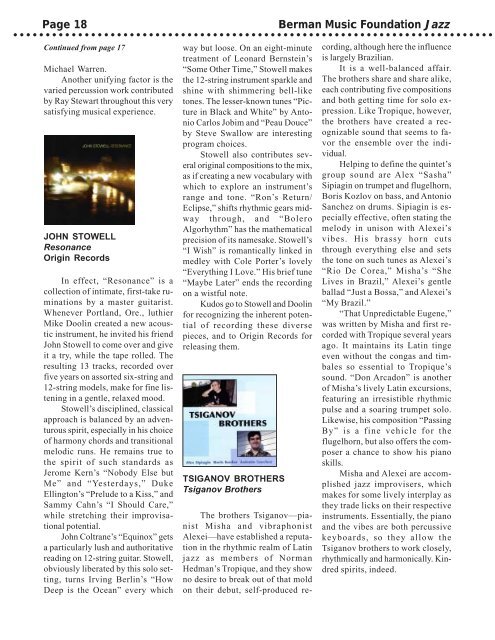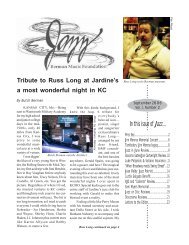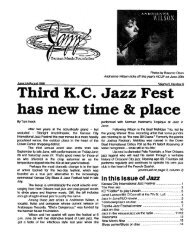Last Topeka Jazz Festival - Berman Music Foundation
Last Topeka Jazz Festival - Berman Music Foundation
Last Topeka Jazz Festival - Berman Music Foundation
Create successful ePaper yourself
Turn your PDF publications into a flip-book with our unique Google optimized e-Paper software.
Page 18<br />
<strong>Berman</strong> <strong>Music</strong> <strong>Foundation</strong> <strong>Jazz</strong><br />
○ ○ ○ ○ ○ ○ ○ ○ ○ ○ ○ ○ ○ ○ ○ ○ ○ ○ ○ ○ ○ ○ ○ ○ ○ ○ ○ ○ ○ ○ ○ ○ ○ ○ ○ ○ ○ ○ ○ ○ ○ ○ ○ ○ ○ ○ ○ ○ ○ ○ ○ ○ ○ ○ ○ ○ ○ ○ ○ ○ ○ ○ ○ ○ ○ ○ ○ ○ ○ ○ ○ ○ ○ ○ ○<br />
Continued from page 17<br />
Michael Warren.<br />
Another unifying factor is the<br />
varied percussion work contributed<br />
by Ray Stewart throughout this very<br />
satisfying musical experience.<br />
JOHN STOWELL<br />
Resonance<br />
Origin Records<br />
In effect, “Resonance” is a<br />
collection of intimate, first-take ruminations<br />
by a master guitarist.<br />
Whenever Portland, Ore., luthier<br />
Mike Doolin created a new acoustic<br />
instrument, he invited his friend<br />
John Stowell to come over and give<br />
it a try, while the tape rolled. The<br />
resulting 13 tracks, recorded over<br />
five years on assorted six-string and<br />
12-string models, make for fine listening<br />
in a gentle, relaxed mood.<br />
Stowell’s disciplined, classical<br />
approach is balanced by an adventurous<br />
spirit, especially in his choice<br />
of harmony chords and transitional<br />
melodic runs. He remains true to<br />
the spirit of such standards as<br />
Jerome Kern’s “Nobody Else but<br />
Me” and “Yesterdays,” Duke<br />
Ellington’s “Prelude to a Kiss,” and<br />
Sammy Cahn’s “I Should Care,”<br />
while stretching their improvisational<br />
potential.<br />
John Coltrane’s “Equinox” gets<br />
a particularly lush and authoritative<br />
reading on 12-string guitar. Stowell,<br />
obviously liberated by this solo setting,<br />
turns Irving Berlin’s “How<br />
Deep is the Ocean” every which<br />
way but loose. On an eight-minute<br />
treatment of Leonard Bernstein’s<br />
“Some Other Time,” Stowell makes<br />
the 12-string instrument sparkle and<br />
shine with shimmering bell-like<br />
tones. The lesser-known tunes “Picture<br />
in Black and White” by Antonio<br />
Carlos Jobim and “Peau Douce”<br />
by Steve Swallow are interesting<br />
program choices.<br />
Stowell also contributes several<br />
original compositions to the mix,<br />
as if creating a new vocabulary with<br />
which to explore an instrument’s<br />
range and tone. “Ron’s Return/<br />
Eclipse,” shifts rhythmic gears midway<br />
through, and “Bolero<br />
Algorhythm” has the mathematical<br />
precision of its namesake. Stowell’s<br />
“I Wish” is romantically linked in<br />
medley with Cole Porter’s lovely<br />
“Everything I Love.” His brief tune<br />
“Maybe Later” ends the recording<br />
on a wistful note.<br />
Kudos go to Stowell and Doolin<br />
for recognizing the inherent potential<br />
of recording these diverse<br />
pieces, and to Origin Records for<br />
releasing them.<br />
TSIGANOV BROTHERS<br />
Tsiganov Brothers<br />
The brothers Tsiganov—pianist<br />
Misha and vibraphonist<br />
Alexei—have established a reputation<br />
in the rhythmic realm of Latin<br />
jazz as members of Norman<br />
Hedman’s Tropique, and they show<br />
no desire to break out of that mold<br />
on their debut, self-produced recording,<br />
although here the influence<br />
is largely Brazilian.<br />
It is a well-balanced affair.<br />
The brothers share and share alike,<br />
each contributing five compositions<br />
and both getting time for solo expression.<br />
Like Tropique, however,<br />
the brothers have created a recognizable<br />
sound that seems to favor<br />
the ensemble over the individual.<br />
Helping to define the quintet’s<br />
group sound are Alex “Sasha”<br />
Sipiagin on trumpet and flugelhorn,<br />
Boris Kozlov on bass, and Antonio<br />
Sanchez on drums. Sipiagin is especially<br />
effective, often stating the<br />
melody in unison with Alexei’s<br />
vibes. His brassy horn cuts<br />
through everything else and sets<br />
the tone on such tunes as Alexei’s<br />
“Rio De Corea,” Misha’s “She<br />
Lives in Brazil,” Alexei’s gentle<br />
ballad “Just a Bossa,” and Alexei’s<br />
“My Brazil.”<br />
“That Unpredictable Eugene,”<br />
was written by Misha and first recorded<br />
with Tropique several years<br />
ago. It maintains its Latin tinge<br />
even without the congas and timbales<br />
so essential to Tropique’s<br />
sound. “Don Arcadon” is another<br />
of Misha’s lively Latin excursions,<br />
featuring an irresistible rhythmic<br />
pulse and a soaring trumpet solo.<br />
Likewise, his composition “Passing<br />
By” is a fine vehicle for the<br />
flugelhorn, but also offers the composer<br />
a chance to show his piano<br />
skills.<br />
Misha and Alexei are accomplished<br />
jazz improvisers, which<br />
makes for some lively interplay as<br />
they trade licks on their respective<br />
instruments. Essentially, the piano<br />
and the vibes are both percussive<br />
keyboards, so they allow the<br />
Tsiganov brothers to work closely,<br />
rhythmically and harmonically. Kindred<br />
spirits, indeed.





